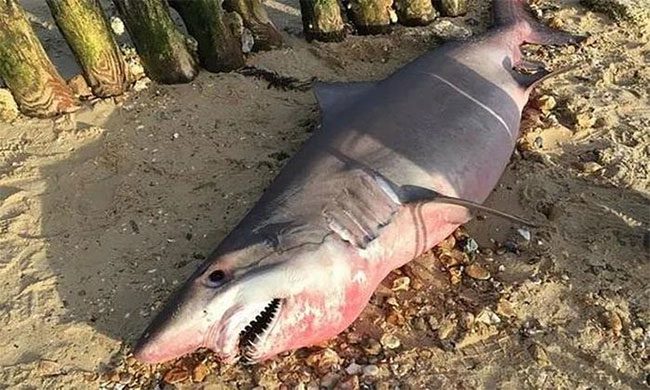Researchers are calling for the return of the head of a sand tiger shark that washed up on the shores of Lepe, England, as this rare species could serve scientific purposes.
The 2-meter-long sand tiger shark was initially found off the coast of Lepe, Southern England, on March 17.

Sand tiger shark washed up on the shores of Lepe. (Photo: Solent News/Guardian).
Alisha Openshaw, a hairdresser from Hampshire, reported that she discovered and rescued the shark. She pulled the animal from shallow waters and saw it swim away. However, the shark was later found dead on the beach, according to the Guardian.
Historian Dan Snow was dispatched to protect and examine the shark. However, upon arrival, the head, tail, and fins of the shark had been severed and taken away.
Mr. Snow stated that the remaining part of the shark was stored in a local resident’s refrigerator until the London Animal Association could collect it.
On March 19, Dan Snow made an urgent appeal to recover the shark’s head.
“We want to protect the shark for scientific purposes, but it’s too late now. Please, if you have the shark’s head, get in touch. Scientists want to study it and will return it to you afterward,” he wrote on Twitter.
The Shark Trust, an organization promoting the conservation of animal species, mentioned that the shark’s head could hold details about the life of this creature, even before birth.
Sand tiger sharks are not aggressive towards humans but are commonly found in warm coastal waters in England. However, sightings of sand tiger sharks in Lepe are rare.
“Whenever we see a whale stranded or a shark washed ashore, it feels like discovering a Roman treasure or Viking daggers,” said Ben Garrod, a professor at the University of East Anglia.
This species of shark can grow up to 4 meters long and weigh as much as 289 kg. The International Union for Conservation of Nature (IUCN) estimates that there are less than 250 individual sand tiger sharks still in existence.


















































